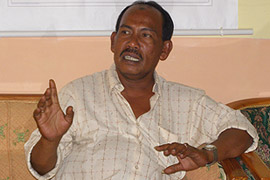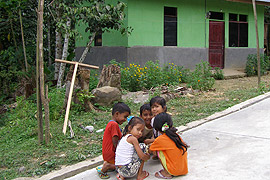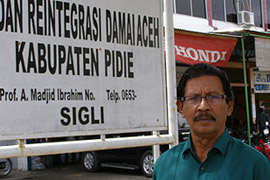‘Ticking time-bomb’ in Aceh
Frustration over unfair aid distribution and foot-dragging could boil over.

 |
| New housing areas dot Aceh’s once-barren landscape, thanks to the ceasefire |
After nearly 30 years of conflict, Indonesia‘s western-most province of Aceh has been enjoying relative peace since the government and Free Aceh Movement (GAM) separatists signed a peace deal in 2005.
Following the ceasefire, GAM disbanded its military wing and became a political entity called the GAM party.
Under the peace agreement Jakarta allowed Aceh to hold elections and run a partially autonomous government.
| In depth |
The province was also supposed to keep 70 per cent of all revenue generated from its oil and gas reserves but most of the proceeds continue to go to Jakarta, one of the major factors that triggered the separatist uprising in the first place in 1976.
Some former rebels say the central government is also dragging its feet on helping them reintegrate into society as promised under the Helsinki agreement.
Local and international observers have warned of growing unrest among former combatants – between those who have received assistance and those who have not.
They say it is only a matter of time before the oil-rich province slides into another conflict.
‘Patience has limits’
A former high-ranking official in the separatist movement says the central government in Jakarta is simply not serious about implementing all the terms of the peace deal.
 |
| Harun said Jakarta’s failure to keep its promises has “created a ticking time-bomb” |
M Harun Ibrahim, now the GAM party’s number two, says former fighters are still waiting for promised housing, economic development and financial assistance.
“Jakarta‘s failure to deliver on the promised deal has created a ticking time-bomb,” says the GAM chief information officer.
“It’s been more than three years and we are still waiting for that to happen … and let’s not forget patience has its limits too.”
The Aceh Peace and Reintegration Board (BRA), set up in 2006, is supposed to provide economic assistance to former rebels – numbering anywhere between a few hundred to a few thousand – and to compensate victims of the conflict.
But reintegration efforts are beset by problems such as an absence of clear goals and a lack of planning and accountability.
Blame game
Compounding the problems is a well-oiled patronage network that draws huge benefits for former rebel leaders.
Harun says the benefits under the reintegration plan were mostly reaching just the former leaders instead of being distributed equally.
“Many of the ex-combatants hardly have enough to eat,” he says.
 |
| About 15,000 people were killed in the conflict, many of them women and children |
“When they hear about their former officers enjoying a good life now, they feel betrayed.”
The GAM party says it runs computer skills training and English classes for children of former rebels and victims as part of its own poverty alleviation programme.
The Brussels-based International Crisis Group (ICG), in a report published late last year, partly blamed the failure of reintegration efforts on internal problems among former rebels where allegations of inequitable distribution of benefits “further divided a fractious and decentralised GAM”.
It said that GAM party officials and former combatants were allegedly involved in extortion, robbery and illegal logging.
“But [the] unresolved issues between Aceh and Jakarta are the real time-bomb,” it said, adding that the BRA “has been dysfunctional since its creation”.
Who is to provide the funding for official reintegration work is also unclear, with the ICG saying “it was not clear if reintegration funding was provided for in the 2005 peace agreement”.
In January New York-based International Centre for Transitional Justice said in a report that “the limited focus on reintegration is giving rise to significant tensions and divisions”.
It said there was “some initial success” in reintegrating former combatants into local communities but warned that failed implementation could “threaten the stability of the peace in Aceh”.
Although an estimated 80 per cent of former combatants have gone into farming since the peace deal was struck, thousands more are still waiting for assistance.
Lack of funds
The BRA itself blames the central government for holding back on funding needed for proper reintegration.
 |
|
Nordin blames Jakarta for not being |
Nordin Gani, the BRA chief in Pidie, a known rebel stronghold near the east coast, says the “real problem is in Jakarta, not here”.
“How can we implement reintegration projects when funds are merely trickling in?” he says.
“The other problem is the government has never given us the requested allocation.”
Despite the shortage of funds, the BRA has given out scholarships to orphans, compensated victims, conducted livelihood programmes for widows and even secured the release of GAM fighters who had been jailed for petty crimes, mostly driven by poverty.
The Helsinki agreement also provided for a national truth and reconciliation commission like the one in post-apartheid South Africa to address human rights abuses during Aceh’s conflict.
But disagreements over the form and content of the commission have delayed its formation.
Following the peace deal, the Indonesian parliament passed the Law on the Governance of Aceh outlining the power-sharing arrangement between the two governments.
Jakarta was to retain control over key policy areas while the Aceh government was to have veto power over local legislative as well as administrative matters of special interest to it.
But the main problem hindering full implementation of the peace agreement, including the formation of the truth commission, is the lack of supporting regulations.
Eddy Purwanto, who leads an agency to co-ordinate Aceh’s tsunami aid projects, says “at least 33 such regulations have not been enacted by parliament”.
“Until this is done, the commission cannot be created,” says the chief operating officer of the Aceh-Nias Rehabilitation and Reconstruction Board.
As discontent grows in Aceh, observers say the central government in Jakarta needs to act quickly to set up the commission and help victims and former fighters properly reintegrate into society or it may soon find itself with another conflict on its hands.
